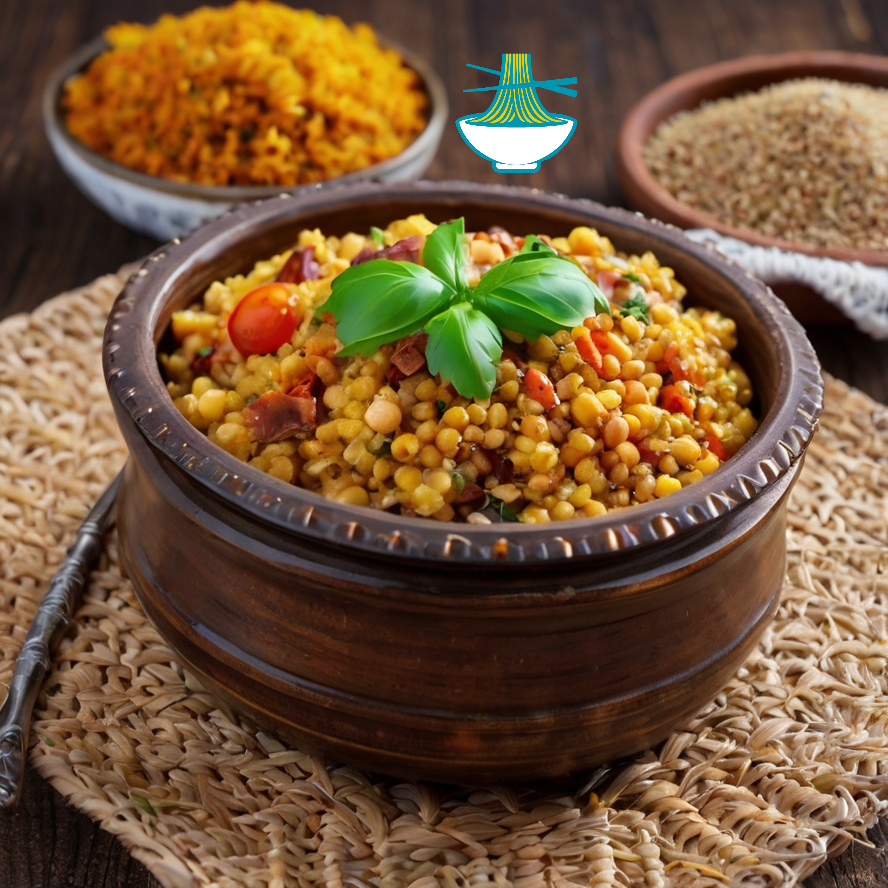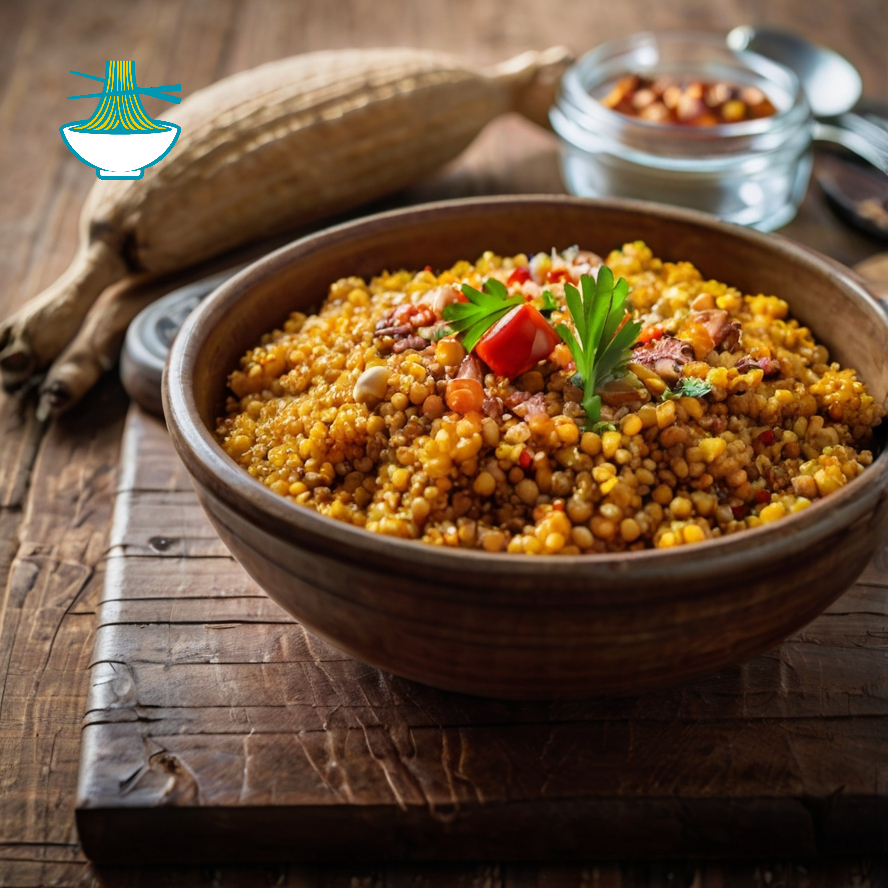Discover the authentic taste of Hassoua, a classic dish made with nutritious sorghum or millet, combined with tender meat or fresh vegetables. This flavorful and hearty recipe showcases traditional cooking methods and ingredients, perfect for a comforting meal. Learn how to make Hassoua with step-by-step instructions and tips for a delicious and satisfying experience.
Ingredients:
- 1 cup sorghum or millet
- 500g meat (beef, lamb, or chicken), cut into cubes
- 2 tablespoons vegetable oil
- 1 large onion, finely chopped
- 2 garlic cloves, minced
- 2 tomatoes, chopped
- 2 carrots, sliced
- 1 bell pepper, chopped
- 1 teaspoon ground cumin
- 1 teaspoon ground coriander
- 1/2 teaspoon paprika
- 1/2 teaspoon turmeric
- 4 cups water or beef/chicken broth
- Salt and pepper to taste
- Fresh parsley or cilantro for garnish
Instructions:
Prepare the Sorghum or Millet:
- Rinse the sorghum or millet under cold water and drain. Set aside.
Cook the Meat:
- Heat the vegetable oil in a large pot over medium heat. Add the chopped onion and garlic, and sauté until translucent.
- Add the meat cubes and cook until browned on all sides.
Add Vegetables and Spices:
- Stir in the chopped tomatoes, carrots, and bell pepper. Cook for about 5 minutes, until the vegetables start to soften.
- Add the ground cumin, coriander, paprika, and turmeric. Stir well to combine.
Simmer:
- Pour in the water or broth, and bring to a boil. Reduce heat to low and let it simmer for 30-40 minutes, or until the meat is tender and cooked through.
Cook the Sorghum or Millet:
- Add the rinsed sorghum or millet to the pot. Stir to combine, then cover and let it simmer for an additional 20-30 minutes, or until the grains are tender and have absorbed the flavors.
Season and Serve:
- Season with salt and pepper to taste. Garnish with fresh parsley or cilantro before serving.
Enjoy your Hassoua with a side of yogurt or a fresh salad for a complete and satisfying meal!
Nutritional Values
Sorghum or Millet
- Calories: 130-200
- Protein: 4-6 grams
- Carbohydrates: 30-40 grams
- Fiber: 2-4 grams
- Iron: 1-2 mg
- Magnesium: 60-90 mg
Benefits:
- High in Fiber: Helps with digestion and promotes a healthy gut.
- Rich in Protein: Supports muscle growth and repair.
- Gluten-Free: Suitable for those with gluten intolerance or celiac disease.
- Rich in Micronutrients: Contains essential minerals like iron and magnesium that support overall health.
Meat (Beef, Lamb, or Chicken)
- Calories: 200-250
- Protein: 20-25 grams
- Fat: 10-15 grams
- Iron: 2-3 mg
Benefits:
- High-Quality Protein: Provides essential amino acids needed for muscle maintenance and repair.
- Rich in Iron: Supports healthy blood and prevents anemia.
- Contains B Vitamins: Important for energy production and metabolism.
Vegetable Oil
- Calories: 120
- Fat: 14 grams
- Saturated Fat: 2 grams
Benefits:
- Source of Healthy Fats: Provides essential fatty acids that support cell function.
- Vitamin E: Acts as an antioxidant, protecting cells from damage.
Onion
- Calories: 45
- Protein: 1 gram
- Carbohydrates: 11 grams
- Fiber: 2 grams
Benefits:
- Rich in Antioxidants: Contains compounds like quercetin that may reduce inflammation and support heart health.
- Supports Immune Function: Contains vitamins and minerals that boost the immune system.
Garlic
- Calories: 5
- Protein: 0.2 grams
- Carbohydrates: 1 gram
Benefits:
- Anti-Inflammatory: Contains allicin, which has been shown to reduce inflammation and improve cardiovascular health.
- Antibacterial Properties: May help fight infections and support overall immune function.
Tomatoes
- Calories: 22
- Protein: 1 gram
- Carbohydrates: 5 grams
- Fiber: 1 gram
Benefits:
- Rich in Lycopene: An antioxidant that may reduce the risk of certain cancers and promote heart health.
- Supports Skin Health: High in vitamins A and C, which are important for skin health and immune function.
Carrots
- Calories: 25
- Protein: 0.5 grams
- Carbohydrates: 6 grams
- Fiber: 2 grams
Benefits:
- High in Vitamin A: Supports vision health and immune function.
- Rich in Antioxidants: Helps protect cells from damage and supports overall health.
Bell Peppers
- Calories: 25
- Protein: 1 gram
- Carbohydrates: 6 grams
- Fiber: 2 grams
Benefits:
- Rich in Vitamins A and C: Promotes skin health and boosts the immune system.
- Antioxidants: Contains various antioxidants that support overall health.
Ground Cumin
- Calories: 8
- Protein: 0.4 grams
- Carbohydrates: 1 gram
Benefits:
- Digestive Health: May aid in digestion and reduce bloating.
- Anti-Inflammatory: Contains compounds that can help reduce inflammation.
Ground Coriander
- Calories: 5
- Protein: 0.2 grams
- Carbohydrates: 1 gram
Benefits:
- Antioxidant Properties: Helps protect cells from damage.
- Supports Digestion: May aid in digestion and reduce symptoms of indigestion.
Paprika
- Calories: 6
- Protein: 0.3 grams
- Carbohydrates: 1 gram
Benefits:
- Rich in Vitamins A and E: Supports eye health and immune function.
- Antioxidant Effects: Helps combat oxidative stress and inflammation.
Turmeric
- Calories: 8
- Protein: 0.2 grams
- Carbohydrates: 1.5 grams
Benefits:
- Anti-Inflammatory: Contains curcumin, which can reduce inflammation and support joint health.
- Antioxidant: Helps protect against cell damage and supports overall health.
Salt and Pepper
- Salt adds flavor but should be used in moderation to avoid excess sodium intake.
- Pepper contains piperine, which may enhance the absorption of nutrients and add a spicy kick.
Fresh Parsley or Cilantro
- Calories: 5
- Protein: 0.5 grams
- Carbohydrates: 1 gram
Benefits:
- Rich in Vitamins and Antioxidants: Provides vitamins A, C, and K, and has antioxidant properties that support overall health.
- Supports Digestion: May help with digestion and freshen breath.


Comments